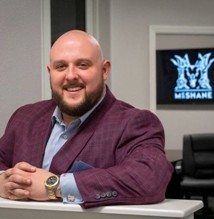











 -
-
McShane LLC -
 Rory McShane
Rory McShane
Founder
McShane LLC
Contact:
Rory K. McShane
(202) 770-
Interview conducted by:
Lynn Fosse, Senior Editor
CEOCFO Magazine
CEOCFO: Mr. McShane, what is McShane LLC all about?
Mr. McShane: We are a consulting public relations media and advertising firm. Our real specialty is using analytical data to help our corporate clients and political clients achieve their target market. So whether that target market is voters or a specialized consumer sect, our specialty is using high-
CEOCFO: What are some of the simpler things you can figure out from data, and what are some of the concepts or ideas that perhaps others do not recognize, that data can drive?
Mr. McShane: I do not think the average person understands how much data is available to them in their daily lives. Your credit card company sells your purchase history so how often you eat fast food is available data, if you have pets is available data, do you drive an American or foreign-
I do not think the average person realizes that advertisers have access to all that data. By using all that data, we can build a profile of individual voters and target market segments specifically that are most likely able to convert into potential voters, potential customers, or whatever the case may be.
CEOCFO: Are there some types of data that are more significant than others?
Mr. McShane: Some of the things that are important to know are your education level and what your spending habits are like. Your education level, your income level, and your spending habits determine far more than even the political party you are registered with. If you have a republican voter with a Ph.D. in literature from a northeastern university, your life looks much different than a republican voter registered with the same party with a high school education from West Texas.
CEOCFO: What is involved with the technology of putting various data together?
Mr. McShane: The way I would describe it is it is a process called analytical modeling which is where you take a random sample of individuals and you ask them questions about maybe a certain candidate or a certain issue or a certain product and you see if they like that candidate, product, or whatever it may be and then you look for the socioeconomic field that those people have in common. Do they share a certain type of education or income, are they a certain race or religious denomination? Are they a certain age or live in a certain part of the country? So on and so forth.
Then you take those socioeconomic factors that they have in common and you go get all the people in the market to share those factors so you can deduce with a relatively high level of certainty that anyone else who shares a significant amount of those factors has a similar opinion about that product, candidate or issue.
CEOCFO: Where does the human element come in?
Mr. McShane: We are synthesizing the human element into ones and zeroes. Human beings are dishonest. For example, every human being will tell you that they hate negative campaign ads but the data says the negative campaign ads are far more effective. How do we know that? We look at the TV viewership, they watch Desperate Housewives, they watch Monday Night Wrestling, and they watch these programs that are about conflict.
It is about drama, so frankly the old days of putting some big thinkers in a room together and having them brainstorm concepts is largely going the way of the Dodo, as we can decipher far better what motivates people with data than they can tell us themselves.
CEOCFO: What might you know from experience or gut feeling; does that come in at all?
Mr. McShane: It does and that is why we have a great team here that has a high level of experience in political marketing and public affairs. What they can do is look at subsets of voters or consumers and draw on strategies from other campaigns and their experience and say with this particular subset of voters or consumers, this sort of advertising was effective therefore let's try that again here.
CEOCFO: When something happens on a macro level that you don’t expect, how does that factor in what you might be working on at the time or in the future?
Mr. McShane: If the data was analyzed correctly that would have been something that we completely expected. If you have people of a certain age studying at certain universities on certain educational tracks, their socioeconomics tells us that those people are most likely to take a liberal position on that issue.
CEOCFO: When you put all the technology together, are there somewhat standard applications, have you combined some? How do you know what is going to give you the most accurate information, and does it change often?
Mr. McShane: We are constantly auditing various technology vendors and constantly seeing who is delivering. We are meeting with a technology vendor on Friday, so we are constantly auditing and seeing who is delivering the most accurate data, and who is most reliable, but what we look for above everything else is data that we can successfully match to various advertising properties. Some of the key advertising properties we use are cell phone numbers, Facebook accounts, and mobile device ID numbers. These are ways we can take this data and instead of it being nameless and faceless data, we can match it in a way that we can get in touch with the person.
One of the ways we compare our data sources is we taking them and see what is the percentage of them that we can accurately match to Facebook accounts, cell phone numbers, and mobile device ID numbers. We compare the data sources to see if we can get data from this source, how many people we can match to their online presence or mobile presence, and so forth.
CEOCFO: How might you tailor an ad for a campaign whether it is political or a particular advertiser for perhaps a non-
Mr. McShane: It starts with what the customers' goal is. For example, for a long time, one of our largest clients was a medical device company. They sold a medical device that was specifically used by internal doctors to scan organs. They were not interested in talking with everyone in the medical profession, they were not even interested in talking to every doctor. They were only interested in talking to this very select number of doctors. In the United States in a country of 300 million people, they were only interested in talking to about 14 thousand people.
The difference between what we do and a traditional marketing agency is if you are selling Coca-
With what we do it is almost the inverse; we are advertising to such a small group of people that the goal is customer acquisition more than it is cost per conversion. I think that it cost $400 to $600 to acquire a new customer but that did not matter because the technology that they were selling to the customer was premium technology at a significant price point that was very useful to those doctors. Therefore, it did not matter that we had to pay large amounts because we were not interested in targeting every house on Maple street, we were interested in targeting one house in an entire city block where that doctor worked.
CEOCFO: What has changed in your approach over time?
Mr. McShane: The constant change is that more and more data is constantly becoming accessible. We are in a time and place now where the level of data that we have access to is where just two years ago I could not even dream of having access to.
The second thing that is changing in this landscape is what the big advertising platforms will allow us to do and not do. There was a time when you could get on Facebook and run an ad targeted to everyone who followed Donald Trump or followed Joe Biden or followed Kamala Harris or followed Governor Ron DeSantis or whomever but you can no longer do that. We have to build out those socioeconomic profiles to give us people who we feel are most likely to support other candidates or causes.
Keeping up with the ever-
CEOCFO: Do you do much outreach to new clients or are people coming to you at this point?
Mr. McShane: We do some, I would say probably 80% of our revenue is a referral.
CEOCFO: Do you typically work with a client on an ongoing basis or is it campaign by campaign?
Mr. McShane: We have both. We have clients who pay us a monthly fee to serve as an advisor to them in all of their needs and as part of that, we will suggest a campaign. I would say it is a 50/50 split. We have other clients who will hire us for a specific project for a limited-
CEOCFO: How do you work with your clients so that they understand what they need to do to contribute to a successful campaign?
Mr. McShane: The truth is we try to always set very reasonable expectations upfront. For example, a corporate client here, what we will tell them upfront is that they are selling a piece of technology (medical device) which is a five-
Our goal is to shorten the sales cycle for their salesman so that when one of their salesman calls on these doctors' offices that it is not the first time they have heard of them and they will be educated about their product. It shortens the distance the salesman has to cover.
We try to be upfront with our clients about exactly what they can expect and exactly what they will need to do if they want that big program to be successful. Sometimes they listen and sometimes they won't but we try to as sternly as possible set those expectations at the first meeting.
CEOCFO: Would you tell us about your recognition on the INC list?
Mr. McShane: It was great to be listed in the INC list. When we started as a company it was three of us working in my garage and then we moved into a smelly terrible office down by the airport in Las Vegas, and now we are a company with a presence in four or five states. It is an incredible feeling. I think this is true of all businesses and not just our sector but when we started there were a lot of people who said we would never make it and we would never achieve large-
CEOCFO: Why choose McShane?
Mr. McShane: Typically, agencies of our type exist in one of two models, the first model is what I would call the super firms. Some of these are some great firms and they are run by friends of mine, such as Axiom Strategies, FP 1, Michael Best. These are firms that have two thousand to three thousand clients at any given time and they have staffs of 200-
We have approximately twenty staff between our two offices and at any given time we have thirty to forty clients on retainer, thirty to forty ongoing projects, and our goal is to we can provide an in-
McShane LLC | Targeted Marketing Campaigns | Targeted Marketing Strategies | Data Driven Marketing Strategy | Data Driven Marketing Campaigns | Rory McShane | McShane LLC -